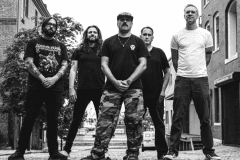Grooms released their new album, Exit Index, via Western Vinyl on October 20. Exit Index is the follow up to Grooms’ 2015’s Comb The Feelings Through Your Hair which tastemakers labeled “defiantly liberated.” On their latest, the band, which consists of singer-guitarist Travis Johnson, drummer Steve Levine, and bassist Jay Heiselmann. combines the abandon of pop with the unease of American life in 2017, cloaking its hooks in a clamor of samples and distortion, its agitation expressed in its dream-poetry lyrics. The album as a whole is a study in contrasts-light meeting dark, amplifier fuzz surrounding big melodies, sampled friction squaring off with fluidly played basslines and tightly wound rhythms.
Grooms laid down the skeleton tracks for Exit Index at the storied New York recording studio The Magic Shop. Collin Dupuis (Angel Olsen, Lana Del Rey) mixed the album, adding a few finishing touches to intros and song structures while also making the structures Grooms constructs sound even more massive and imposing. Exit Index also marks the first time Grooms had the same lineup for two records in a row.”
Ghettoblaster recently spoke with Johnson, who has also co-owned the Brooklyn pedal company Death By Audio Effects since 2008, and made a limited-edition distortion pedal to celebrate the album’s release. “This is what he told us about the endeavor.
This is your first album since 2015. But you actually wrote the album while in the studio for a month, right? Did you begin writing before that?
I had been working on ideas since pretty much as soon as our last album came out. “Horoscopes,” “End,” and “Turn Your Body” were all things that had been written in the spring of 2015 or so. Then we went on tour for that album for the whole fall and came back and worked on those and started working on new stuff. We rented a practice space that we had constant access to for a full month, not sharing it with anyone else, which we’d never done. It was down the street from both Steve and me, so a lot of times I’d get an idea at like 1 in the morning and text Steve to see if he wanted to go to the deli and then work on stuff in the middle of the night. At the end of that month we had band versions of those first three and like nine more, then went into the studio.
Was there a deliberate plan for what you were hoping to accomplish as you began writing Exit Index?
I remember telling Jay and Steve that I wanted it to sound alien, strange, unnatural. I wasn’t positive what that meant though. And I wanted us to push ourselves to not rely on things we already knew we could do.
And the material for the album was recorded the last day you were there, right? Were you feeling the pressure?
Yeah, we had one day to record at the Magic Shop. It was pretty insane. The studio was closing like the next day. We had basically no time for not nailing takes. There were certain things that were really special about it though: recording vocals on the same microphone Bowie had used on his last two albums, working with the very strange Neve console they had at in the studio, knowing it was all ending at the studio very soon. I wonder where all that amazing recording gear they had ended up.
How has the heaviness of the current political environment in America impacted the music you make?
It completely permeated it in a way that I’ve never really let the world at the time of recording affect anything. The album is, for better or worse, dripping with fear and anger and unease. The title Exit Index is a reference to wanting a way out of the situation we were, and are, in. I let my worst thoughts come through, thinking that at least some of them wouldn’t come true, but then they did.
There are a lot of samples on the record too, right? Who was behind that?
Yeah, that was me. I’d been working with a lot of synths and samples late at night, while my wife was asleep, making these extended collages and things that didn’t really fit a structure. Some of those made their way onto the album in little clips, like the beginning of “The Directory” or the end of “End.” And then a lot of the samples I’d collected got placed here and there throughout the record. I was watching the Republican debates for some unknown reason, every one of them, and the feel of those debates was just a bunch of frightening people constantly talking over each other. So, putting together dense sections of unknown sounds talking over each other made sense.
What did Dupuis lend to the process?
He did a lot. When we were handing it off to him to mix it, I told him the references we had for the album, told him what I imagined it sounding like. A lot of what he did was just making things sound better, but he also went in and chopped up certain sections and rearranged them in ways that wouldn’t have occurred to us at all.
You released the video for “Turn Your Body,” staring Darcie Wilder. What was it about that track that made it stand out as a single in the band’s mind’s eye? What was the process of making that video like?
I think the main thing about that song being a single was that it didn’t sound like our previous records but still seemed accessible. That video idea was totally haphazard, just Steve and I going back and forth on weird little ideas. We liked the idea of a video that just focused on a little moment, not something grand or loud or overly grabby. We filmed it in one day and I think edited it that night.
Is there a moment or moments on the record that continues to capture your attention? Is there a part you obsess over? If so, why?
Probably all of “Thimble.” That’s maybe my favorite Grooms song. When the saxophone appears at the end, courtesy of my friend Ryan Seaton, I’m always thinking, “oh yeah, this part is so good.” But now the album is out so I probably won’t listen to it again for a while. I tend to listen a lot to a record of ours until it’s out and then just put it behind me.
Did you use several of your own pedals on the album? If so, which ones on which songs?
Yeah, lots. Most of the guitars, if not all, are going through the Interstellar Overdriver constantly. Most of the delay is the Echo Dream 2. The last section of “End” is letting the LFO on that pedal audibly thump, then compressing the hell out of it while feeding ambient loops through it. I think the guitar solo on “Some Fantasy” is through a Fuzz War, plugged straight into the preamp, no amplifier.
Who else is making gear that you find fantastic or enviable? Did you use any of it on the record?
Lots of people. BAE seems to make really good preamps and EQs, Eventide makes pedals that are these vast worlds. I’m not super brand oriented when it comes to gear. If I hear a thing that sounds cool or that gives me ideas, I’ll try and get that thing. I don’t really follow any companies, anxiously awaiting what they do next or anything like that. I know a lot of people who do. Maybe it’s just that I already have so much stuff I’m still trying to find the limits with that.
You actually created a limited-edition pedal to celebrate the album’s release, right? Can you tell us about that?
Yeah, the Death by Audio Exit Index was based around the idea of an audible LFO. A lot of people don’t want that, but I think sometimes it can be cool. There’s plenty of tremolo pedals out there that aren’t as mangled and warped sounding as this one, so this is a mangled and warped tremolo with an audible LFO that fucks with the sound. There’s a lot of tremolo and some LFO thump on the album, so I wanted to just push that into some weird direction, that wouldn’t be for everyone but would be unique and interesting for some.
Are there any other pedals that you are working on that you can sneak tease us about?
Not yet! Soon though.
Will you be touring in support of the record?
God, I hope so.







Social Media